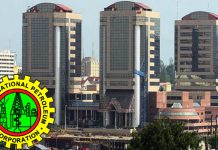The European Union (EU) is working on a €20 billion ($22.7 billion) financing package to support African transport networks, as well as energy, digital, education and health projects to counter China’s reach in the continent.
Member states, a Bloomberg report disclosed, however, have yet to commit to financing the infrastructure plans, according to officials familiar with the discussions.
The bloc’s plan includes strategic corridors, international submarine cables, new energy interconnections, and investments in renewable sources in Senegal, Cote d’Ivoire, Egypt, Morocco and Kenya, according to a draft of the package seen by Bloomberg.
But Nigeria, Africa’s most populous nation and the biggest economy on the continent, was missing on the list of countries to directly benefit from the move.
Last year, President Muhammadu Buhari said Nigeria’s low share of Foreign Direct Investment (FDI) flow to Africa between 2015 and 2019 was a cause for concern. Buhari, who spoke at a retreat organised by the Nigeria Extractive Industries Transparency Initiative (NEITI) in Uyo, the Akwa Ibom State capital, described the situation as unacceptable.
Despite having the biggest economy in Africa, Nigeria only received four per cent, which was about $3 billion of the $75 billion invested in the continent in the first term of Buhari’s administration.
According to the United Nations Conference on Trade and Development (UNCTAD) 2020 World Investment Report, FDI flows to Nigeria showed a 48.5 per cent decrease compared to the previous year.
Nigeria has a poorly developed transport and energy infrastructure, resulting in high operating costs, an inefficient judicial system and unreliable dispute settlement mechanism as well as serious security concerns.
Secretary to the Government of the Federation (SGF), Mr. Boss Mustapha, represented Buhari on the occasion.
However, the report stated that the investment was aimed at underpinning the new partnership that the EU and Africa want to seal at a February 17-18 summit in Brussels.
African leaders have prioritised roads, railways and bridges, but some EU governments face national budgetary constraints that make it hard for them to pledge significant funding ahead of the meeting.
Others, including Germany, the report stated, remain sceptical about the readiness of some of the proposals, officials added.
The EU list included about 60 projects meant to relaunch the relationship, after months of tensions over vaccine supplies and patents, as well as travel restrictions aimed at stemming the COVID-19 pandemic.
Most of the funds in the EU’s plan would go to the Global Gateway, Europe’s initiative to rival China’s massive investment plan in the continent. The bloc is seeking to mobilise €150 billion euros by 2027 from various sources.
EU offers “quantitative and qualitative advancements on infrastructure financing,” according to the document.
The bloc promises “substantial funding” to invest in projects and for technical assistance to identify new ones. The EU also wants to attract private money by using public funds as guarantees and involving African development banks.
China promised in 2018 around $60 billion in loans over a three-year period to finance roads and bridges in Africa. But China’s Belt and Road plan, Bloomberg said, has been controversial from the outset “due to corruption and debt sustainability challenges” faced by host governments.
The EU has picked projects focused on key trade areas selected by African nations according to their level of readiness, their potential impact, and the possibility of attracting member states’ money and private funding, an EU official said.
The list includes the Dakar-Abidjan corridor in West Africa; the Libreville-Kribi-Douala-N’Djamena area that links Gabon, Cameroon and Chad; and the area between Mombasa and Kisangani in Kenya and Democratic Republic of Congo.
The trading bloc wants to show that they are putting money behind their promises by offering a solid package during the summit.
But the commission has been struggling to bring member states on board, in spite of intense discussions. Two-thirds of the financing should come from national coffers, the commission told national capitals.
Europe would also propose building an international submarine fibre cable to connect the EU with Africa along the Atlantic coast, and fostering access to clean energy pools across the continent.
The EU would also offer new security cooperation. As part of more comprehensive effort to support African armed forces, European countries would deliver military equipment in the coming months “including material designed to deliver lethal force,” according to the draft text.
Migration would be another top issue during the summit next week. EU countries will mobilise €4.4 billion to fight human traffickers, enforce voluntary and forced returns, and strengthen border management.
One of the European demands is to secure a bigger role for its border agency, Frontex, in African nations, the report stressed.




